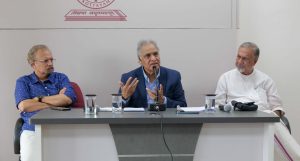
The reservation policy has been in place for over five to six decades, yet the condition of Scheduled Castes (SCs) in the country remains dire, according to Prof. Sukhadeo Thorat, former Chairman of the University Grants Commission (UGC), the Indian Council of Social Science Research (ICSSR), and Professor Emeritus at Jawaharlal Nehru University. Prof. Thorat was delivering the Dr. K. Mathew Kurian Memorial Lecture 2024, organized by the Inter University Centre for Social Science Research and Extension (IUCSSRE), Mahatma Gandhi University (MGU), in association with the K.R. Narayanan Chair and the K. Mathew Kurian Chair at MGU.
Prof. Thorat highlighted that SCs continue to rank highest in terms of landlessness, illiteracy, lack of access to education, and minimal representation in the private sector. “The untouchables lag behind higher castes across all development indicators,” he stated. Despite decades of affirmative action, disparities between caste groups persist, with untouchables still grappling with malnutrition and hunger. Educational attainment among middle castes is lower than that of higher castes but better than that of untouchables, reflecting a graded inequality in education—a distinctive feature of the caste system. Lower-income groups, particularly within lower castes, face the most severe challenges in educational attainment due to inequalities in wealth and income ownership, as well as caste-based discrimination.
According to Prof. Thorat, the caste system enforces fixed civil, cultural, and economic rights for each caste, restricting mobility and excluding lower castes from the rights and occupations of higher castes. “This systemic exclusion and discrimination, particularly in economic spheres like labour and employment, is inherent to the caste system’s principles,” he explained. In the context of a market economy, such occupational immobility operates through restrictions in markets like land, labour, credit, and services, perpetuating discrimination in production processes.
He further noted that Indian society is characterized by multiple forms of exclusion based on caste, ethnicity, gender, and religion, affecting social, political, and economic spheres. Over the past fifty years, development has benefited groups unevenly, prompting marginalized communities to seek solutions to their specific issues. Within Hindu society, the principle of “graded inequality” ensures that not all castes suffer equally, with untouchables bearing the greatest burden. Among non-Hindus, elements of the caste system have spilled over into converted religions like Christianity and Islam, leading to continued discrimination, albeit not to the same extent as within Hinduism, Prof. Thorat added.
The session was chaired by Michael Tharakan, former Vice Chancellor of Kannur University. K.M. Seethi delivered the welcome address, and Rajesh Komath proposed the vote of thanks.